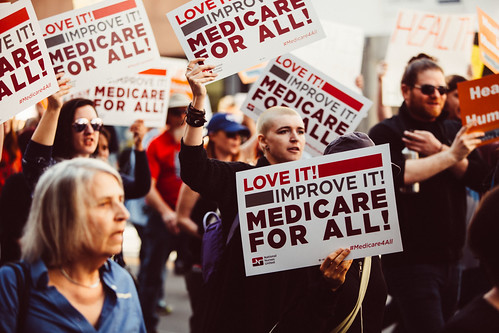1. Our sick healthcare system
The availability and quality of healthcare is surely one of the best measures of a nation's success, and of its respect for the value of human life. Beginning in 1883 with Germany, most developed nations (except the U.S.) have instituted universal healthcare in which everyone has "access to the full range of quality health services they need, when and where they need them, without financial hardship." Americans continue to tolerate an inefficient and unequal system run by a swollen "multi-billion-dollar for-profit healthcare industry devoted to parasitically extracting money from us . . . like a giant, bloodsucking tick" (Thom Hartmann).
To appreciate the harm our predatory healthcare system is doing to us, let's begin with the per capita cost of healthcare (including both individual and collective expenses). Developed countries with universal healthcare, as reported by the Organization for Economic Co-operation and Development (OECD), spend about half as much as we do. In 2021, the U.S. spent $12,138 per person on healthcare, compared to Italy ($4038), UK ($5387), Canada ($5905), France ($6115), and Germany--the most expensive--($7383). If the U.S., with a population of 334 million, is annually spending around $6000 per capita more than comparable nations, then it is wasting $2 trillion per year. I say "wasting" because there is no good reason for our healthcare to cost twice as much as that of comparable nations. The grim truth is that our medical system is grotesquely wasteful despite our collective delusion of economic superiority.
Even with our $2 trillion national overpayment, we are far from having universal healthcare. In 2020, 31.6 million (9.7%) people of all ages were uninsured at the time of their interview by the National Health Service. The uninsured can easily get into serious medical debt from unavoidable hospitalization and costly medical procedures. This may result in lawsuits from hospitals and providers, as well as loss of credit and even bankruptcy. In addition to the uninsured, there is a much larger underinsured population. According to The Commonwealth Fund, "Twenty-nine percent of people with employer coverage and 44 percent of those with coverage purchased through the individual market and marketplaces were underinsured" (i.e. unable to access some of their healthcare without financial hardship). This problem is often due to high deductibles and co-pays and can lead people to neglect symptoms, not to take prescribed medications, and choose not to keep follow-up appointments with their doctors.
In addition to leaving millions of people uninsured or underinsured, the quality of the care delivered by our system is inferior to that of nations with universal healthcare. The Commonwealth Fund, in an Aug. 4, 2021 report comparing healthcare outcomes among 11 high-income nations (Australia, Canada, France, Germany, the Netherlands, New Zealand, Norway, Sweden, Switzerland, the U.K. and U.S.), ranked the U.S. last. Here's what we get for our $2 trillion overcharge:
Compared to other countries, the U.S. performs poorly on maternal mortality, infant mortality, life expectancy at age 60, and deaths that were potentially preventable with timely access to effective health care. The U.S. rate of preventable mortality (177 deaths per 100,000 population) was more than double that of the best-performing country, Switzerland (83 deaths per 100,000).
In a 6/13/22 article in The Proceedings of the National Academy of Sciences, researchers concluded that "338,594 COVID deaths are attributable to incomplete insurance coverage in the United States."
2. The false dichotomy of market vs government
Why are we so passive about our broken and wasteful medical system? Politicians tell us nothing can be done, yet so much is being done in other countries. Our politicians know better, but are lying to us. How do they get away with it?
By its very nature, universal healthcare requires a strong degree of government involvement. But large corporations have spent enormous sums lobbying against such a role for government. They have brainwashed Americans with a distorted image of government that has inundated our political culture since the election of Ronald Reagan in 1980. Reagan invited his followers to see government as a bogeyman prowling an enchanted place called the 'market,' where people are happily exchanging services and the income from their labor with each other. As he said at a press conference in 1986, "The nine most terrifying words in the English language are 'I'm from the government, and I'm here to help.'"
Market fundamentalism is a creed that takes a few truths about market transactions out of their social context and develops an anarchic fantasy about government. It highlights the voluntary, win-win quality of market transactions--people wouldn't engage in them unless each party believed they would be better off by giving up something in exchange for what the other offered. The satisfaction gained from the transactions motivates everyone to try to satisfy the needs of others in order to be rewarded through more exchanges. The self-interest of market participants operates like an "invisible hand" guiding market transactions to add to the overall benefit of society. Government is an outlier in this domain--its coercive power is needed to safeguard market activity by providing the security and order essential to a functioning market. In that sense, government is a necessary evil; but its power should never be substituted for the free and productive activity of market participants. This minimalist view of government is what drives the so-called Freedom Caucus, an influential 45-member right-wing bloc of House Republicans.
Unlike the airy abstractions invented by market fundamentalists, markets in the real world depend on government for a great deal more than internal and external security. Markets are physical or virtual spaces structured by government through laws and regulations; they are systems designed to serve specific social purposes such as food production and distribution, education, and medical care. All markets will, of course, provide incentives to motivate producers, including profits (prices greater than the cost of providing a product or service). But the laws and regulations governing farms, colleges and hospitals will be as different as their respective social purposes.
Some goods and services, such as basic levels of food, education, and medical care, are essential to life in a civilized society. Democracies are committed to fundamental moral and political equality of all their citizens. This commitment implies universal access to essential goods. Democracies don't let citizens grow up lacking the knowledge to function as adults, or die from starvation or curable illnesses. All citizens unable to provide essential goods or services for themselves must be able to obtain them from the relevant markets. All citizens should therefore have adequate income to access these markets, including a living wage for those who can work.
The government of a democratic society must therefore create a universal healthcare market, a market administered by the government to provide adequate incentives for all providers at a cost affordable to adults with income equivalent to a living wage. This is already being done to a significant degree by all other nations comparable to the U.S. A frequently proposed model for such a system is Medicare For All, a key ingredient of Bernie Sanders' 2020 presidential primary campaign. The Congressional Budget Office (CBO) has published a 200-page analysis of Medicare for All, which concludes that "such reform would achieve universal coverage, bolster provider revenues for clinical services, and eliminate almost all copayments and deductibles--even as overall health care spending fell."
(Note: You can view every article as one long page if you sign up as an Advocate Member, or higher).






